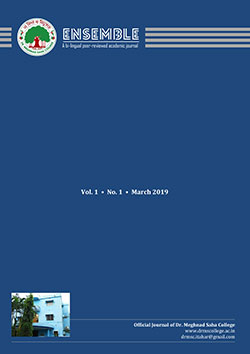Reading Creative Translations of Jibanananda Das’s Bengali Poetry into English: A Journey across the Frontiers of Experiences
Abstract
Indian English literature generally refers to that body of writing, which is produced in the English language by the litterateurs of an Indian origin. It is however, understandable that creative translations should also be located into the corpus of Indian English literature. Historically speaking, what gave the first solid footing to Indian English poetry was Rabindranath Tagore’s Gitanjali, and this came in the form of creative translation. After Rabindranath we find another accomplished poet of twentieth century Bengal to practice creative translation of his Bengali poetry into English. This poet is Jibanananda Das, whose English-language poetry in the form of creative translation is yet to receive a broader audience. The present paper seeks to study three of these creative translations titled Meditations(Manosarani in Bengali), Darkness (Andhakar in Bengali) and Sailor(Nabik in Bengali), which seem to form a complex sequel in respect of Jibanananda’s deep concern for the socio-cultural unrest that characterized the general fabrics of life in Bengal after the Partition of 1947. Moreover, these poems appear equally contemporary in the twenty first century, when the disruptive forces of corruption, falsehood, debauchery, political coercion and cultural denigration are more severely at work to corrode and annihilate the cultural roots of Bengal. So, the purpose of the present study is two-fold: first, to show how the creative translations of Jibanananda continue to strike the note of a universal humanity in the present times, and second, to voice for their inclusion in forthcoming anthologies of Indian English poetry. For, these poems composed by one of the greatest poets of modern Bengal would make room for readers from all over India to savour the taste of a fine artistry that transcends the limits of every ideological bias.
Key words:Indian,literature,contemporary,socio-cultural unrest,modern, partition, sensibility, twentieth century
https://doi.org/10.37948/ensemble-2021-0301-a016
Views: 1572



